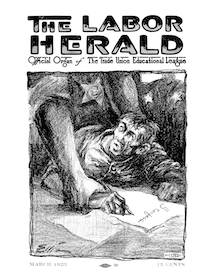Summary | Excerpt | Reviews | Beyond the Book | Read-Alikes | Genres & Themes | Author Bio

This article relates to The Last Ballad
 America prospered at the turn of the 20th century, but that prosperity wasn't reflected in working conditions or compensation for laborers. Many on the left felt the American Federation of Labor leadership was corrupt and began to support Eugene V. Debs' Socialist Party. There was then a further schism, created by those who felt Debs' party continued to ignore the most oppressed workers, and that allowed the Communist Party to step into the void. From that wing sprang the radical Industrial Workers of the World in 1905, a communist union.
America prospered at the turn of the 20th century, but that prosperity wasn't reflected in working conditions or compensation for laborers. Many on the left felt the American Federation of Labor leadership was corrupt and began to support Eugene V. Debs' Socialist Party. There was then a further schism, created by those who felt Debs' party continued to ignore the most oppressed workers, and that allowed the Communist Party to step into the void. From that wing sprang the radical Industrial Workers of the World in 1905, a communist union.
Unions, socialist or communist, found no better place to fight for their causes than within the cruel industrial engine of manufacturing, mills, and mines. The horrid conditions explored in Cash's novel, The Last Ballad, seem near slavery to a modern worker: 12-hour shifts 6-days a week, company housing and company stores that consumed every dollar earned, and poor or nonexistent medical care and workmen's compensation in spite of high injury rates and mortality.
 Owners and managers focused on a Darwinian pursuit of capital and profit over worker welfare. Responding to the draconian working conditions, the Communist Party founded the Trade Union Educational League (TUEL) in 1920, which was later renamed the Trade Union Unity League (TUUL). The organization had some success among garment workers; and later in the strike at Gastonia, North Carolina with the National Textile Workers (it is this conflict that drives the narrative of Cash's novel.) TUUL expanded to miners next, then food workers and maritime sailors and longshoremen. The Communist Party provided funds to unions, and organizers (whether identified as communists or not), and spot facilities such as soup kitchens.
Owners and managers focused on a Darwinian pursuit of capital and profit over worker welfare. Responding to the draconian working conditions, the Communist Party founded the Trade Union Educational League (TUEL) in 1920, which was later renamed the Trade Union Unity League (TUUL). The organization had some success among garment workers; and later in the strike at Gastonia, North Carolina with the National Textile Workers (it is this conflict that drives the narrative of Cash's novel.) TUUL expanded to miners next, then food workers and maritime sailors and longshoremen. The Communist Party provided funds to unions, and organizers (whether identified as communists or not), and spot facilities such as soup kitchens.
 Most importantly, the evolution toward socialism/communism faced its greatest roadblock because of Franklin D. Roosevelt. FDR came from wealth; nevertheless, he was politically astute and understood that abject working conditions, the lack of a social safety net, and the oppression of the poor by rich capitalists would mean the destruction of American democratic republicanism. FDR's New Deal – the Civilian Conservation Corps, Civil Works Administration, the Federal Housing Authority, Public Works Administration, Social Security, and other similar programs – were key in restricting left-leaning third parties by coopting much of their ideology and reframing it to fit the American Dream. What remained of the Communist Party in America effectively faded away in the post-WWII Cold War era.
Most importantly, the evolution toward socialism/communism faced its greatest roadblock because of Franklin D. Roosevelt. FDR came from wealth; nevertheless, he was politically astute and understood that abject working conditions, the lack of a social safety net, and the oppression of the poor by rich capitalists would mean the destruction of American democratic republicanism. FDR's New Deal – the Civilian Conservation Corps, Civil Works Administration, the Federal Housing Authority, Public Works Administration, Social Security, and other similar programs – were key in restricting left-leaning third parties by coopting much of their ideology and reframing it to fit the American Dream. What remained of the Communist Party in America effectively faded away in the post-WWII Cold War era.
The Communist Party USA still exists, headquartered in New York City, with an (estimated) 3,000 national membership, which is 0.0009% of the United States' population.
Eugene Debs
Cover from the Trade Union Educational League's The Labor Herald
Eleanor Roosevelt talks with a project superintendent in Des Moines, Iowa. June 8, 1936 about a WPA project, courtesy of www.fdrlibrary.marist.edu
Filed under Society and Politics
![]() This "beyond the book article" relates to The Last Ballad. It originally ran in November 2017 and has been updated for the
June 2018 paperback edition.
Go to magazine.
This "beyond the book article" relates to The Last Ballad. It originally ran in November 2017 and has been updated for the
June 2018 paperback edition.
Go to magazine.
Your guide toexceptional books
BookBrowse seeks out and recommends the best in contemporary fiction and nonfiction—books that not only engage and entertain but also deepen our understanding of ourselves and the world around us.